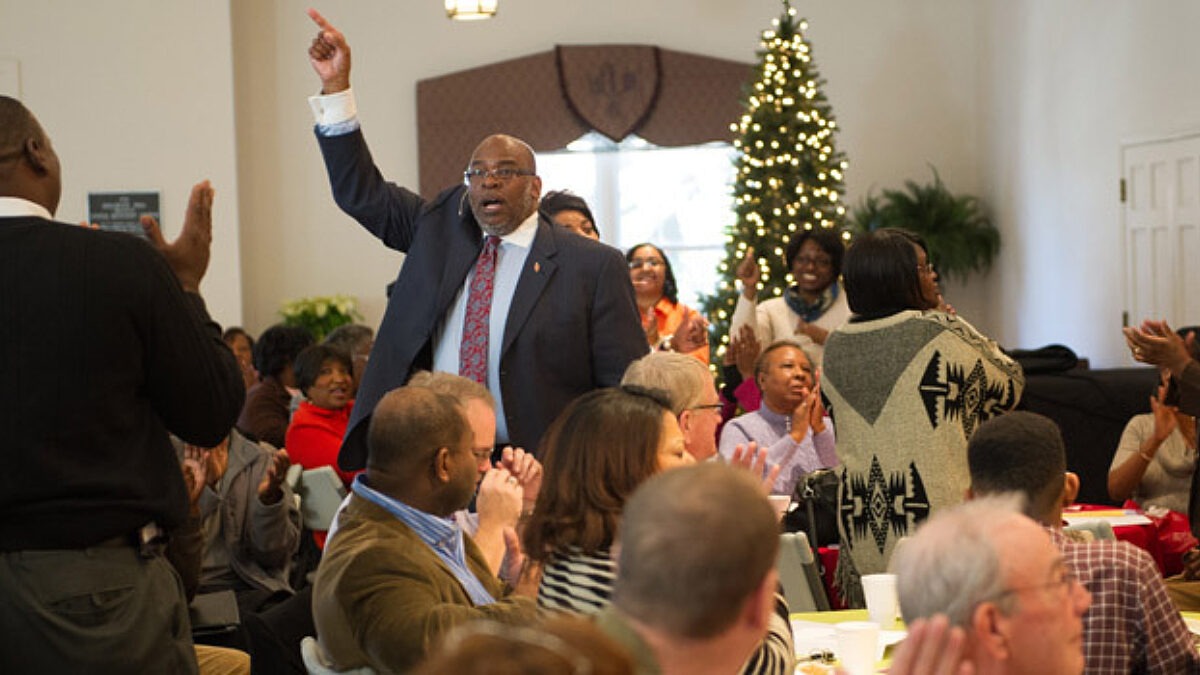
Leading better: Bishop’s Barbecue Bashes
By Jessica Brodie
From skits to wolf analogies to inspirational teaching from Bishop Jonathan Holston—not to mention great barbecue—clergy and lay leaders continued their district-wide gatherings last month.
Holston made two more stops on his statewide Bishop’s Barbecue Bash tour in December, heading to the Hartsville District Dec. 5 and the Marion District Dec. 12 to dialogue with people about what it means to be a leader in today’s church.
The day the Advocate visited, in the Hartsville District, scores of pastors were gathered with their laity, eagerly awaiting a strong word from their bishop and key district leaders.
The morning opened with a video about the reintroduction of the wolf into Yellowstone National Park, and the tremendously positive impact one species had on the landscape—an impact that ultimately changed the course of a river.
“Do you believe a wolf can change a river?” the Rev. Marvin Caldwell asked the crowd, who responded with a resounding yes. “The same thing lies with us—all we have to do is be who we are. A lot of people are saying we are crying ‘wolf,’ but many of our churches are struggling with what it means to be United Methodist. … All we have to do is be who we are, but that’s hard to do.”
And with that, the teaching began, as clergy and laity heard for the next several hours about how to dialogue with respect to people’s individual quirks and spiritual gifts.
The teaching included a skit performed by district leaders about a new member who has joined a church committee that is wrestling among itself—not always kindly—with how to use funds from a sizable donation. The skit illuminated the many personality differences that churches need to accommodate as they come up with a group compromise that serves God.
Four aspects of leadership
Holston spoke for a time on the four aspects of leadership, drawing from Vince Molinaro’s book “The Leadership Contract” about what it means to be a leader in the culture and atmosphere we have today in the life of the church.
He taught how there are four aspects of leadership: it is a decision (you must make it), it is an obligation (must step up), it is hard work (must get tough) and it is about community (must connect).
“We are a church together, and that’s who we are,” Holston said. “It’s not our church, this is God’s church, chosen for God’s purpose.”
And as part of God’s church, he said, we need to look at how we are making a difference not only within the four walls of the church but also in the community, which is what it is really all about. It’s most certainly not about the “next program,” he said.
“We keep forgetting that—it’s not an issue of stuff but an issue of spirituality,” Holston said.
Holston said one key thing he and others learned last year, when he toured the state talking to lay leaders and lay servants in the Bishop’s Road Shows, that working together as a church is about people—and it’s all rooted in trust. We cannot work together well unless we can trust in each other.
“We’re being vulnerable with each other,” he said, noting that leadership is not a position but a behavior. “It’s a decision, and you have to make it.”
But leadership in the church can be uncomfortable, he said, because we’re not just doing what’s right for the group but what’s right for the sake of Christ. Sometimes, he said, we get so caught up in arguing about the little things that we forget the big picture. Holston talked for a time about tailgating, and how people get so excited about going to the game that they are willing to sit in uncomfortable seats in the rain and slog through traffic, all with smiles on their faces, but they come to church and complain. We need to expand our priorities and work together.
“We need to step up,” he said. “Leadership is hard work. Take a look around at your community. It’s not 1950 anymore—or 1960 or 1970 or 1980 or 1990. … Are we the church that’s going to transform lives for the future? Or are we the church that’s going to live in the past? How are we connecting with our community?”
Connectional Ministries Director the Rev. Kathy James followed Holston by noting the people in the room had all been invited in teams as a reason.
“We hope God is calling you,” she said. “Maybe it’s to keep doing something, maybe it’s to tweak something, maybe it’s to stop doing something.”
She urged the room to ask themselves in light of what they’d learned, what is God calling them to do together?
Next barbecue bashes
Two barbecue bashes are scheduled for January (Jan. 9 for the Greenwood District at St. Paul UMC, Saluda, and Jan. 23 for the Columbia District at Chapin UMC, Chapin). The final three are scheduled for February (Feb. 6 for the Greenville District at Advent UMC, Simpsonville; Feb. 13 for the Spartanburg District at Spartanburg Methodist College, Spartanburg; and Feb. 27 for the Walterboro District at Sand Hill UMC, Ridgeville.
Laity interested in attending should contact their pastor. Pastors will receive information about the bashes from their district office.